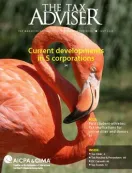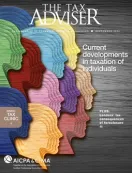Properly established and maintained, an incomplete gift nongrantor trust may play a valuable role in some clients’ estate plans
Types of Trusts
Early terminations of QTIP trusts: The cautionary case of McDougall
Qualified terminable interest property trusts can be useful, but care must be taken to avoid running afoul of their requirements, as a recent Tax Court case illustrates.
Proposed regulations update QDOT regulations
Changes to the qualified domestic trust regulations under Sec. 2056A would include defining when the value of assets passing to the trust is “finally determined.”
A trust is not always a trust for federal income tax purposes
Whether an entity that purports to be a trust is treated as one or as a nominee depends on the facts and circumstances.
Recent CCA raises concerns for irrevocable grantor trust modifications
A Chief Counsel Advice memo holding that adding a tax reimbursement clause to an irrevocable grantor trust will constitute a taxable gift by the beneficiaries to the grantor raises a host of questions that taxpayers and advisers should consider before modifying a trust.
Converting from a QSST to an ESBT, or vice versa
Qualified Subchapter S trusts and electing small business trusts have distinct uses and advantages; fortunately, converting one to the other can be painless.
Rev. Rul. 2023-2’s impact on estate plans
Depending upon the size of their estate, as well as other factors, an irrevocable trust may still be the best answer.
IRS signals it will challenge IDGT basis step-up at death
The IRS recently published Rev. Rul. 2023-2, which publicly announced that the Service will be challenging a basis step-up for assets in intentionally defective grantor trusts.
Trusts as S corporation shareholders
Generally, a trust cannot hold stock of an S corporation; however, grantor trusts, testamentary trusts, voting trusts, ESBTs, and QSSTs are permissible S corporation shareholders (Sec. 1361(c)(2)).
Trusts for holding S corporation interests: QSSTs vs. ESBTs
This article compares the relative advantages and disadvantages of a QSST versus an ESBT in estate planning.
Planning with charitable lead trusts
Today’s low interest rates make charitable lead trusts a more powerful option for tax-efficient estate planning.
Helping a client benefit from an intentionally defective grantor trust
These trusts can be advantageous to wealthier clients, but their future use in estate planning is threatened by current legislative proposals.
The grantor trust rules: An exploited mismatch
This article discusses the history of the grantor trust rules, how they are exploited to avoid taxes, and ways the rules might be reformed to prevent them from being used for tax avoidance.
Recent developments in estate planning: Part 1
This first part of this annual update focuses on trust and gift tax issues.
Planning with revocable trusts after the grantor’s death
This article focuses on the key tax and reporting areas applicable to revocable trusts and the associated planning and pitfalls that arise at the grantor’s death.
Revocable trusts and the grantor’s death: Planning and pitfalls
This article focuses on the key tax and reporting areas applicable to revocable trusts and the associated planning and pitfalls that arise at the grantor’s death.
Recent developments in estate planning: Part 1
This first part of the annual update covers trust and gift tax issues, including regulations explaining deductions permitted for trusts and estates after the TCJA eliminated miscellaneous itemized deductions for individuals.
Inherited IRA strategies after the SECURE Act
This article discusses alternatives to the stretch IRA.
Seize the increased basic exclusion amount
Taxpayers can obtain unique benefits when it comes to gift and estate tax planning by using trusts and taking advantage of applicable valuation conventions.
A shakeup in trust taxation: Kaestner and Paula Trust
This item discusses the implications of the Court’s ruling in Kaestner and compares the issues at hand in Paula Trust.
employee benefits & pensions
Profits interests: The most tax-efficient equity grant to employees
By granting them a profits interest, entities taxed as partnerships can reward employees with equity. Mistakes, however, could cause challenges from taxing authorities.














